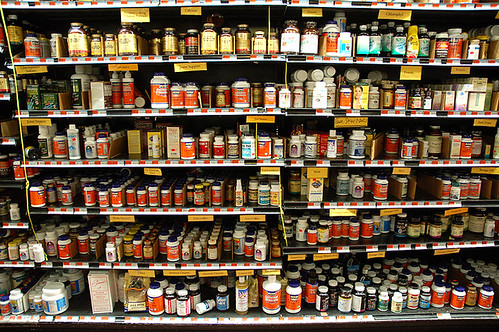As gnolls.org has become more and more widely read, I am receiving more and more questions from my readers in comments, on the forums, and over email—and a significant number of them boil down to “I have [a list of problems], what should I eat?”
First, let me be absolutely clear: I am not complaining! I work very hard every week to write articles that are not only worth your time—they’re worth forwarding to others using the social media buttons at the end. I’m glad you’re here.
However, I need to correct a common misconception. And though this article is mostly addressed to those new to paleo or the paleo-curious, it’s worth all of our time to briefly remind ourselves of a basic truth.
Getting Lost On The Path To Better Health
Most of modern medicine treats physical and mental dysfunctions as medication deficiencies.
- Acid reflux? You’ve got a proton pump inhibitor deficiency.
- Can’t sleep? A classic sign of Ambien deficiency.
- Insulin-resistant? Your metformin intake is inadequate.
- Depressed? Clearly your blood levels of Prozac are too low.
- High blood pressure? That’s textbook—you’re Toprol-deficient.
- Obese? Well…actually, we haven’t found a medication that doesn’t make you crap your pants. Maybe you should do some jumping jacks or something.
Even “alternative medicine” takes this approach, telling us we’re deficient in everything from crushed crab shells to olive leaf extract.

According to the labels, every one of these bottles is absolutely necessary for our good health. It's best not to ask how Paleolithic humans survived without them.
Of course this is baloney, designed to sell us pills. But this pervasive approach has a more subtle destructive effect on our thinking: it lulls us into applying the same fallacious analysis to our dietary needs. Whatever’s wrong with us, there must be an individual dietary prescription to fix it. Some magical balance of protein to fat to carbs, some obscure rainforest fruit rich in antiphytocatopolyresistophenolins, a nut butter that won’t make us fat…
Yes, we all want to believe that we’re all beautiful and unique snowflakes, that each of us deserves a personalized fitness plan, our very own roadmap to better health. Even the paleo community falls victim to the weak version of this fallacy, which is throwing up our hands and saying “Since we don’t understand everything, hey, whatever works for you.”
Consequently, it is important to remember the following:
Acid reflux? Eat like a predator.
Can’t sleep? Eat like a predator.
Insulin-resistant? Eat like a predator.
Depressed? Eat like a predator.
High blood pressure? Eat like a predator.
Obese? Eat like a predator.
And so on.
Unless you have one of a few rare and specific conditions like phenylketonuria (for which you were either tested at birth or died of the complications) or seizures (for which ketogenic diets are often appropriate), it’s highly unlikely that eating a functional paleo diet will cause anything to get worse—and it’s highly likely that you will enjoy improved health, relief of some or all symptoms, improved body composition, and higher energy levels after the period of adjustment required by any major dietary change.
At this point it is important to note the disclaimer I’ve had on the left sidebar for some time:
• Your life and health are your own responsibility.
• Your decisions to act (or not act) based on information or advice anyone provides you—including me—are your own responsibility.
Furthermore, if you ask me “What should I do about my GERD/insulin resistance/recurring rashes/IBS/40 remaining pounds of fat”, the first thing I’m going to ask you is “How many of the steps from Eat Like A Predator have you taken?” If you’re still eating gluten grains, cooking with seed oils, consuming packaged foods (especially those labeled “heart-healthy” or “low-carb”), or drinking soda, my first advice will be “Then stop that.”
Occasional cheating is a different matter…I don’t want to encourage orthorexia by blaming everything on half a brownie you had three weeks ago. But you need to be honest about whether you’re really just cheating, or whether you haven’t fully committed to change.
Conclusion: Better Health Is Less Complicated Than You Think
It’s very profitable to make better health seem like a complex undertaking. If we view “health” as an individual prescription difficult to follow, nearly impossible to maintain, and only dispensed by authority figures, we’ll become dependent on the continual assistance of others—and their pills—and we’ll be forever running in circles chasing the next diabetes drug or magical rainforest antioxidant extract.
Don’t believe the hype. Our ancestors survived, thrived, and multiplied for millions of years, using only their wits and sharp rocks. Humans are not born with medication deficiencies—nor are we metabolically dependent on chemicals extracted at great cost from plants that only fruit or flower seasonally in one small region we didn’t even inhabit until perhaps 11,000 years ago.
No, eating like a predator will not fix every problem. (For instance, infections require antibiotics, antifungals, or anthelmintics…and if your beta cells are gone, you need exogenous insulin.) Neither will it fix your problems overnight: damage done over decades won’t heal fully in days, and some damage may be permanent. But as Dr. Doug McGuff once said about medical testing:
“If the number is bad, eat healthy.
If the number is good, eat healthy.”
You may well be a beautiful and unique snowflake—but you’re a human animal, just like everyone else, and your path to health begins just like everyone else’s.
Live in freedom, live in beauty.
JS
Postscript: Your questions are welcome! There is much to discuss, and plenty of room for optimization once you’re following the basic plan.

